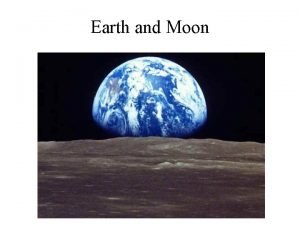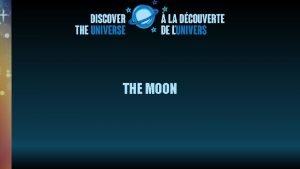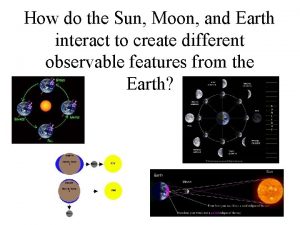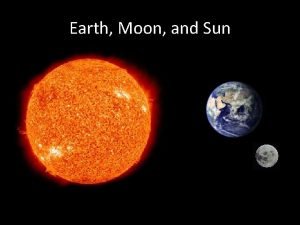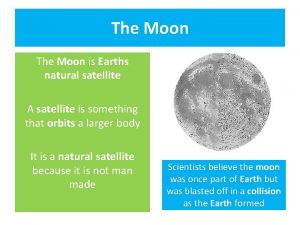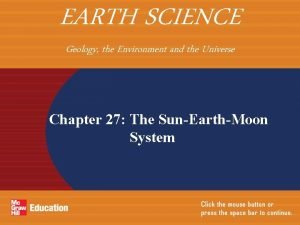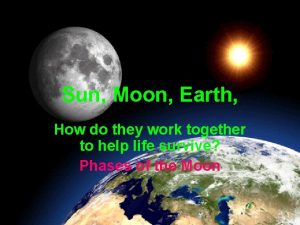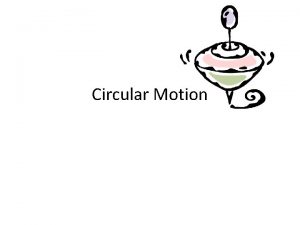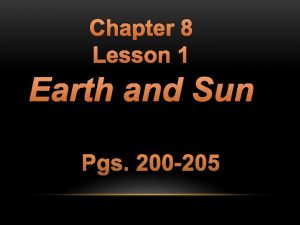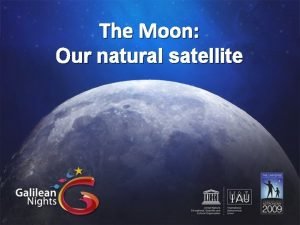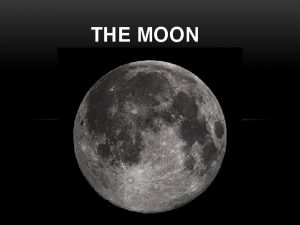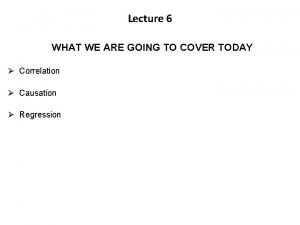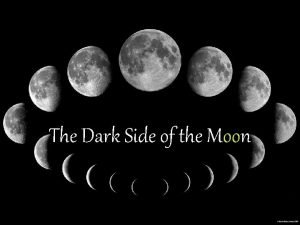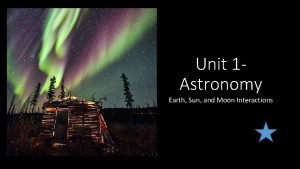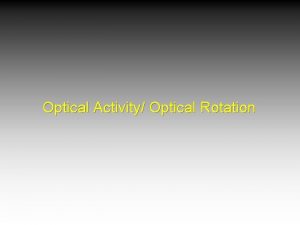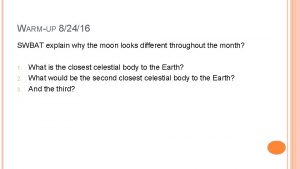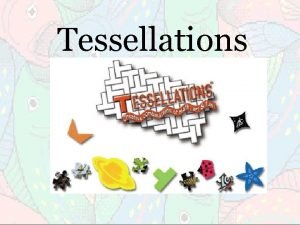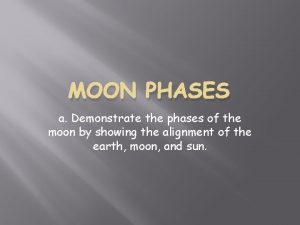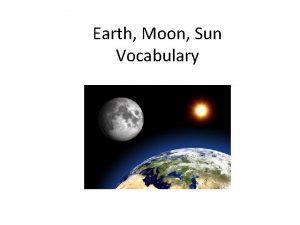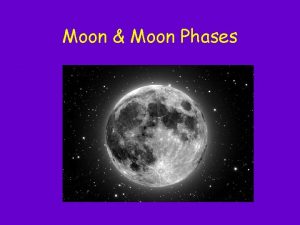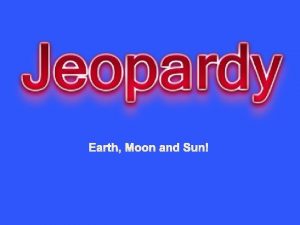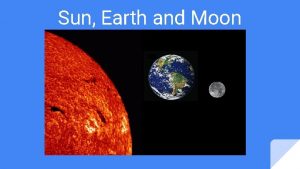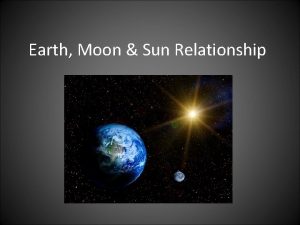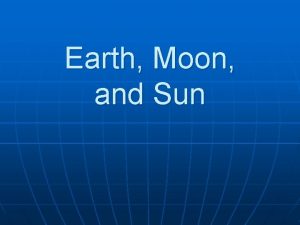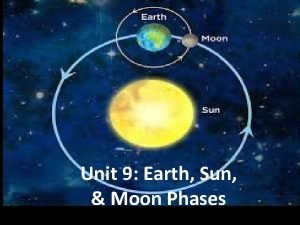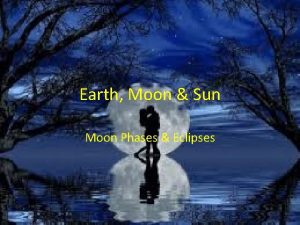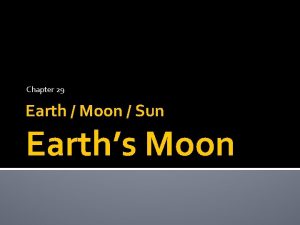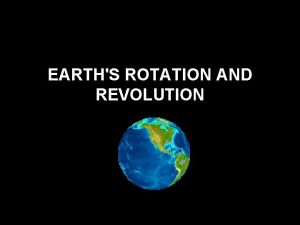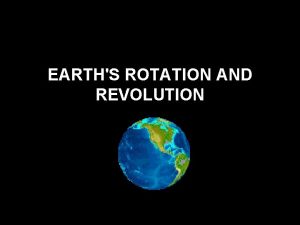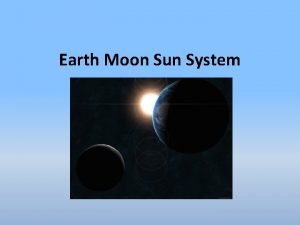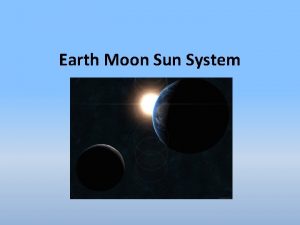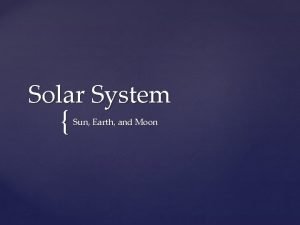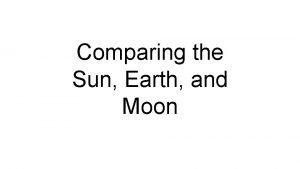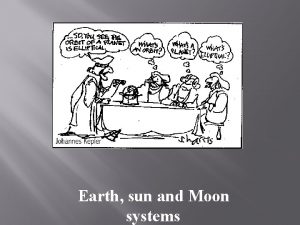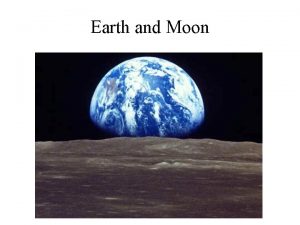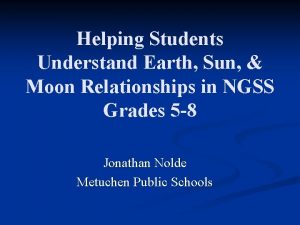Earth Moon Sun Relationships Rotation versus Revolution Rotation


























- Slides: 26

Earth Moon Sun Relationships

Rotation versus Revolution • Rotation is the turning of a body about an axis. – The earth rotates once every 24 hours. • Revolution is the motion of one body around another. – The earth revolves around the sun once every 364 ¼ days.

What is Insolation? Insolation is the amount of radiation per area that reaches the earths surface. The more direct the suns rays hit the surface, the greater the amount of surface heating.

Examples of Insolation

Why Does the Length of Day on Earth Change? • The tilt of the Earth’s axis, axis and the rotation and revolution of the Earth is responsible for the changes in the length of day and night.

Equal Day and Night Vernal and Autumnal Equinox Sun is directly over the Equator

Longer Days, Shorter Nights In Northern Hemisphere Sun is directly over the Tropic of Cancer

Shorter Days, Longer Nights in Northern Hemisphere Sun is directly over the Tropic of Capricorn

Why Do We Have Seasons? • The tilt of the Earth’s axis and the revolution around the Sun cause the Earth to have seasons.

Effects of axis tilt

Effects of revolution

Combined Effects of Tilt and Revolution

Earth’s Seasons - Year

Why Does The Moon Have Phases? • Phases of the moon are determined by: – The relative positions of the earth, moon and sun. • Revolution of moon around the earth. – Your position on the earth.




What is a Solar Eclipse? • A Solar Eclipse is when the Sun is blocked from view by the moon. – The moons orbital path places it in between the earth and the sun.



Phases of a solar eclipse

Solar eclipse, notice solar prominence in carona.

Solar Eclipse

What is a Lunar Eclipse? • A Lunar eclipse is when the moon is blocked by the shadow of the earth. – The moon’s orbital path takes it into the shadow of the earth.

Phases of a Lunar eclipse

Solar versus Lunar Eclipse Note: Solar eclipse = sun blocked; Lunar eclipse = moon blocked
 Earth and sun relationship
Earth and sun relationship Rotation versus revolution
Rotation versus revolution Earth from moon
Earth from moon Does the moon rotate
Does the moon rotate How does the moon earth and sun work together
How does the moon earth and sun work together The sun-earth-moon system worksheet answers lesson 1
The sun-earth-moon system worksheet answers lesson 1 What season is this
What season is this Earth vs sun
Earth vs sun Whats a natural satellite
Whats a natural satellite Chapter 27 study guide the sun-earth-moon system
Chapter 27 study guide the sun-earth-moon system How does the sun moon and earth work together
How does the sun moon and earth work together Rotation and revolution
Rotation and revolution Chapter 8 lesson 1 answer key
Chapter 8 lesson 1 answer key The science duo
The science duo Which moon phase occurs directly before a new moon
Which moon phase occurs directly before a new moon Moon sister moon calendar
Moon sister moon calendar Home.hiwaay.net/ krcool/astro/moon/moon tides/
Home.hiwaay.net/ krcool/astro/moon/moon tides/ What phase is this
What phase is this Deterministic vs statistical relationship
Deterministic vs statistical relationship The moon's rotation
The moon's rotation Suns layers
Suns layers Specific rotation
Specific rotation Moon phases of the sun is on the right
Moon phases of the sun is on the right Spider tessellation
Spider tessellation Moon phases when the sun is on the left
Moon phases when the sun is on the left Moon
Moon Sun moon lake marathon
Sun moon lake marathon


